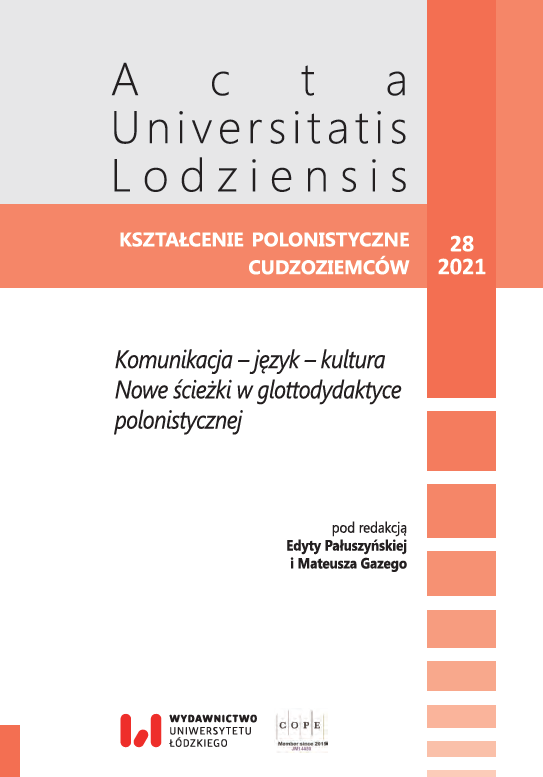Academic genres in teaching polish as a foreign language (with the example of a scientific article)
DOI:
https://doi.org/10.18778/0860-6587.28.19Keywords:
academic discourse community, genre of speech, academic genres, genre pattern, teaching Polish as a foreign languageAbstract
The article aims to emphasise the teaching of utterances representing Polish academic genres, mainly on academic courses of Polish as a foreign language. A large group of learners consists of candidates to Polish universities and foreign students pursuing education in Poland. Being part of the Polish academic community they should be well prepared for the reception and production of genres of speech used in academic discourse. The article presents a genological analysis of a scientific article constituting the basic genre in this discourse. Considering the binding regulations and recommendations included in appropriate textbooks, the author proposes a description of the genre based on the genre theory of John Swales and the concept of the genre pattern of Maria Wojtak. The author recommends teachers of Polish as a foreign language to focus their students’ attention on all aspects of the pattern: structural, pragmatic, cognitive and linguistic, and also show them different variants of the genre: its canonic as well as alternative and adaptive forms. In spite of the high uniformity of utterances, the cultural environment and exponents of the genre should be highlighted.
References
Bachtin M., 1986, Estetyka twórczości słownej, tłum. D. Ulicka, Warszawa.
Google Scholar
Boć J., 2009 (wyd. 9), Jak pisać pracę magisterską, Wrocław.
Google Scholar
Gajda S., 2001, Styl naukowy, w: Współczesny język polski, J. Bartmiński (red.), Lublin, s. 183–199.
Google Scholar
Janowska I., Lipińska E., Rabiej A., Seretny A., Turek P., 2011, Programy nauczania języka polskiego jako obcego. Poziomy A1 – C2, Kraków.
Google Scholar
Kulczycki E., 2016, Struktura artykułu naukowego – uniwersalne wskazówki i wytyczne http://ekulczycki.pl/warsztat_badacza/struktura-artykulu-naukowego-uniwersalne-wytyczne-i-przydatne-wskazowki/ (dostęp: 21.03.2021).
Google Scholar
Rittel S. J., 1996, Dyskurs akademicki, Rzeszów.
Google Scholar
Rozporządzenie MNiSW z dnia 22.02.2019 r. w sprawie ewaluacji jakości działalności naukowej http://isap.sejm.gov.pl/isap.nsf/download.xsp/WDU20190000392/O/D20190392.pdf (dostęp: 13.04.2021).
Google Scholar
Siuda P., Wasylczyk P., 2018, Publikacje naukowe. Praktyczny poradnik dla studentów, doktorantów i nie tylko, Warszawa.
Google Scholar
Swales, J. 2007, Genre Analysis. English in academic and research settings, Cambridge.
Google Scholar
Szkutnik Z., 2005, Metodyka pisania pracy dyplomowej, Poznań.
Google Scholar
Typy publikacji wg POL-index http://pci-www.vls.icm.edu.pl/polindex/info/polski-wspolczynnik-wplywu/typy-artykulow (dostęp: 02.11.2021).
Google Scholar
Wierzbicka A., 1983, Genry mowy, w: Tekst i zdanie, T. Dobrzyńska, E. Janus (red.), Wrocław, s. 125–137.
Google Scholar
Wojtak M., 2004, Gatunki prasowe, Lublin.
Google Scholar
Wojtak M., 2019, Wprowadzenie do genologii, Lublin.
Google Scholar
Wolańska E., Wolański A., Zaśko-Zielińska E., Majewska-Tworek A., Piekot T., 2009, Jak pisać i redagować. Poradnik redaktora. Wzory tekstów użytkowych, Warszawa.
Google Scholar
Wskazówki EASE (Europejskiego Stowarzyszenia Redaktorów Naukowych) dla autorów i tłumaczy artykułów naukowych publikowanych w języku angielskim https://ease.org.uk/publications/author-guidelines-authors-and-translators/ (dostęp: 02.11.2021).
Google Scholar
Zarzycka G., 2016, O wspólnocie dyskursywnej glottodydaktyków polonistycznych, w: I. Janowska, P.E. Gębal (red.), O lepsze jutro studiów w świecie. Glottodydaktyka polonistyczna dziś, Kraków.
Google Scholar
Downloads
Published
How to Cite
Issue
Section
License

This work is licensed under a Creative Commons Attribution-NonCommercial-NoDerivatives 4.0 International License.










